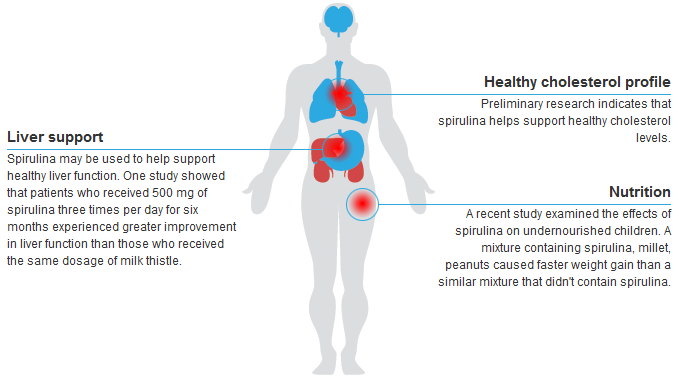Rich in protein and gamma linolenic acid, spirulina is commonly used to support detoxification, immunity, healthy cholesterol levels, and liver function, and may benefit nursing mothers by providing essential nutrients for their babies' development.
Spirulina is a type of bacteria that can perform photosynthesis, which is known scientifically as cyanobacteria. It includes two species in the Arthrospira genus, Arthrospira maxima and Arthrospira platensis. Spirulina is so named because these species were once classified in the Spirulina genus.
Mesoamericans such as the Aztecs used spirulina as a common food source until the 16th century when many of the lakes in Central Mexico were drained to develop other types of agriculture. The commercial production of spirulina was re-established at Lake Texcoco in the early 1970s by the agricultural firm Sosa Texcoco. Spirulina is also traditionally harvested from many lakes around the world such as Lake Chad.
Spirulina is commonly used as a dietary source of protein for vegetarians and vegans. The traditional preparation is to dry it into cakes, which are then used to make a broth. Common commercial preparations of spirulina include flakes, pills, powders, and tablets. Its primary value as a protein source is because it is a complete protein, meaning that spirulina contains all of the essential amino acids. In particular, the levels of cysteine, lysine, and methionine in spirulina are higher than those found in legumes.
The most common health use of spirulina is for detoxification and immunity. It is also used to support a healthy cholesterol profile, including both low-density lipoprotein (LDL) and high-density lipoprotein (HDL) cholesterol. Spirulina may also help support healthy liver function.
Spirulina may be used to help support healthy liver function. One study showed that patients who received 500 mg of spirulina three times per day for six months experienced greater improvement in liver function than those who received the same dosage of milk thistle.
Preliminary research indicates that spirulina helps support healthy cholesterol levels.
A recent study examined the effects of spirulina on undernourished children. A mixture containing spirulina, millet, and peanuts caused faster weight gain than a similar mixture that didn't contain spirulina.

Spirulina is most likely to benefit individuals who are strict vegetarians or vegans, whether it is a lifestyle choice or the result of various health conditions. The absence of animal protein in the diet can result in a lack of one or more essential amino acids that are present in spirulina. The nutrients in spirulina are also easy for the body to assimilate, making it useful for individuals who have difficulty taking in nutrition from other sources. Nursing mothers may also take spirulina for the healthy development of their babies. Spirulina contains a significant amount of gamma linolenic acid, which is an essential ingredient in breast milk.
Shipping calculated at checkout
